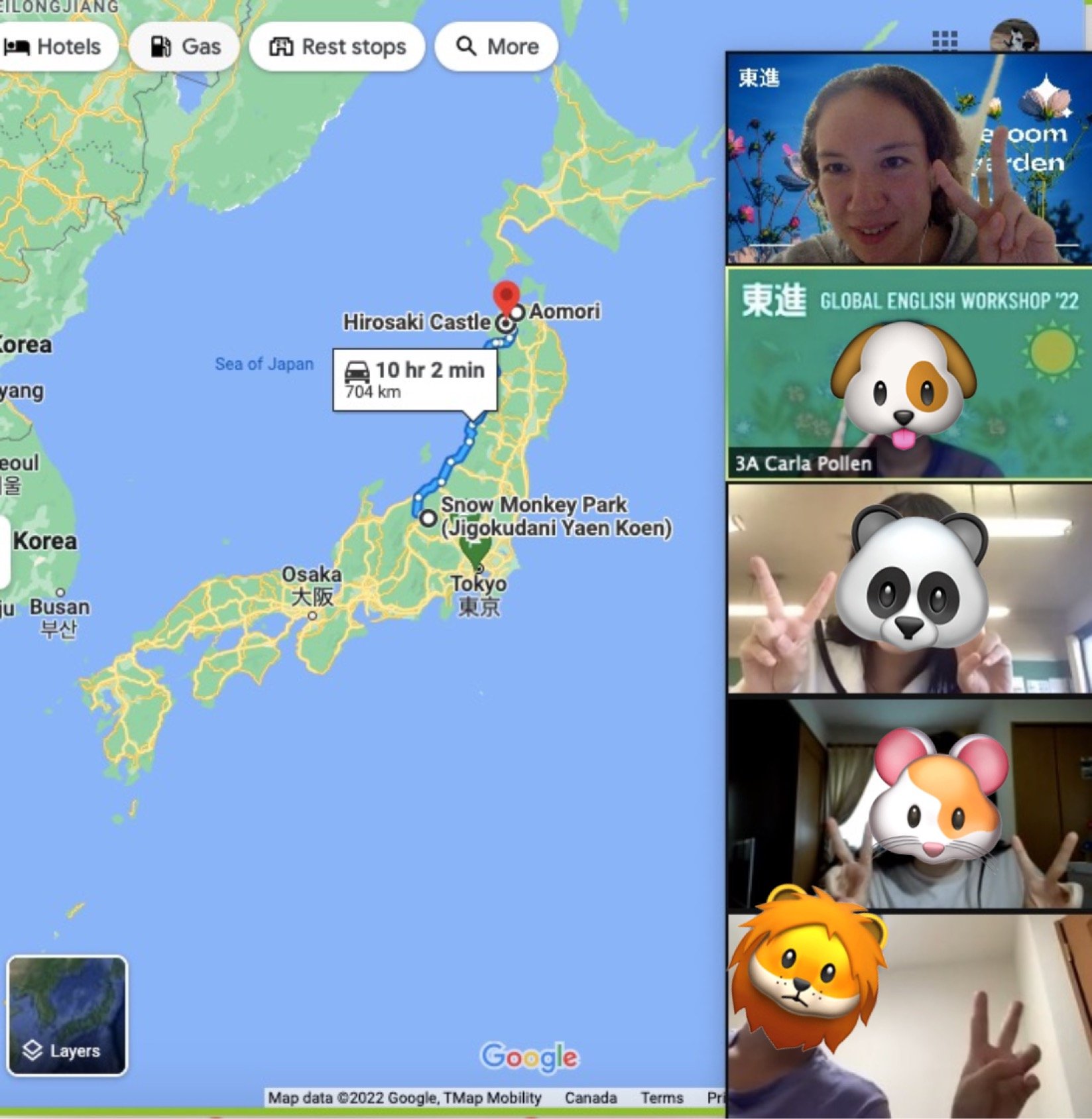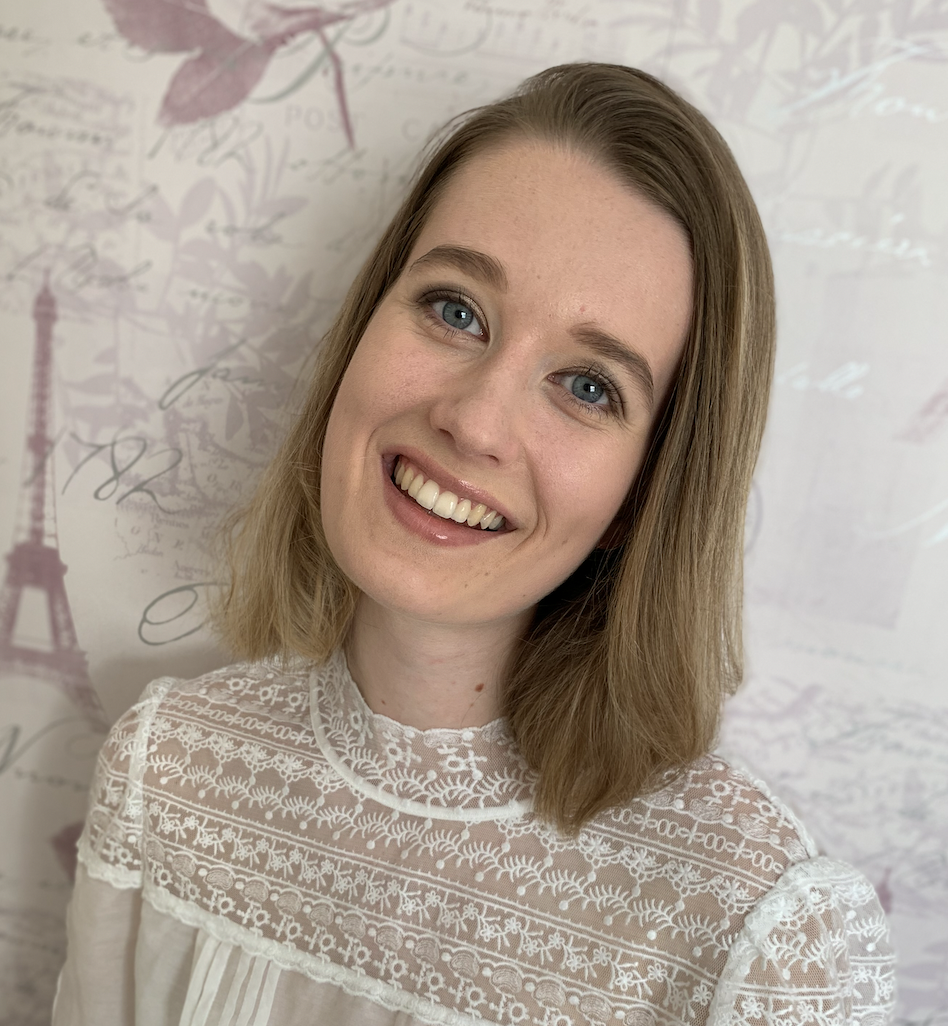Isabelle is entering her final year as an English BA student at UCL. Outside of the lecture hall, she loves to read a variety of fiction and non-fiction, write for different media organisations, play the saxophone, work with her local radio station, meet new people and travel.
When I first came across Come On Out - Japan and the Global English Camp in partnership with Toshin High School, I was instantly intrigued. Having the opportunity to work alongside students and graduates from across the globe, whilst making a positive impact on the lives of Japanese students through supporting their English speaking, struck me as being both unique and thoroughly inspiring.
It is an understatement to say that I was elated when I received my acceptance onto the Global English Workshop in June 2021 as a coach. I was really looking forward to meeting my students and learning more about their lives and visions, whilst working with the people who make this programme happen and becoming part of a global family.
This elation came, however, with an understandable level of anticipation, and lots of questions flooded my mind. This year’s Workshop was modified to suit a remote setting due to the COVID-19 pandemic - would I be able to build a strong rapport with my students and provide a productive and positive experience for them whilst communicating over a screen? Did I know enough about the United Nations’ Sustainable Development Goals, an integral part of GEW? And how on earth was I going to manage waking up at 00:45 for a 01:30 start twice a week?
After months of eager anticipation, July finally arrived and the first weekend of GEW appeared on the horizon. The start of the programme saw my fears fade as I realised that many of my nerves were misplaced. I began to embrace all the excitement that GEW provides and threw all I had into the programme over the next three weekends.
Now the programme is at a close, I have reflected on my journey with Come On Out - Japan and all that being a part of the GEW had taught me. Below is a curation of these thoughts, which I hope will provide an insight into my time as a coach this year and act as advice for if you are considering applying to be a coach in the future (spoiler alert - you should!).
1. Trust in your coaching abilities:
The moment when you leave the Homeroom on the first day and zoom into your individual breakout room with six eager-to-learn students is both exciting and utterly terrifying. Will you make a good first impression? Will you cover everything in the textbook and stick to the timetable?
In these moments of questions and ‘what if’s, I reminded myself of the fact that I had come a long way to get to this stage of the programme, so I must be doing something right. I found that trusting in the skills that led me to earning my place on the programme and having the confidence to give it my absolute best shot was one of the most important things when coaching on GEW.
To help with this confidence, I found it extremely useful to prepare in advance of the first weekend. After our training weekend, I went through the textbook and made detailed notes about the programme timetable, the exercises and anything else I thought would be helpful to have to hand during the Workshop. I created a separate folder on my laptop for all the documents and links I needed during the programme, and made sure I could easily navigate between Zoom, Discord (which coaches, leaders and staff used to communicate during the programme) and the student textbook. This really set my mind at ease and gave me a newfound sense of ‘I can do this’ before the first weekend of the programme.
Lingering doubts and questions were to be expected, but I had nothing to worry about; there were always people ready to help...
2. The support is there if you need it:
Before I entered the programme, I feared I had to know everything there was to know about being a coach on the GEW. As we embarked on the training weekend, however, I realised that this was not the case, and that I had such a strong circle of support around me waiting to answer my questions and help me in times of need during the programme.
Especially as a first-time coach, I found that knowing who I could turn to if I needed assistance during the programme helped me relax and go with the flow more. Simply knowing there are people on standby to help was enough to give me that added confidence, and, as the programme unfolded, I realised that I knew a lot more than I initially thought I did. And, from our Homeroom leaders to Toshin and Come On Out staff, the circle of support remained ready and waiting to assist if you needed it.
The training weekend ahead of the programme that I mentioned earlier was the perfect remedy for pre-programme fears, and we had chance to ask our burning questions if they weren’t answered during the in-depth and informative presentations. If you become a coach on a future GEW and begin to feel the nerves creep in beforehand, know that you’re due to receive an excellent training experience, and that it is totally fine to ask questions throughout the programme too (no matter how silly you think the questions sound, as there is no such thing as a silly question!).
3. The early starts are not as bad as you think they’ll be:
Remote teaching meant an alteration in time zone for many coaches this year. As I’m based in England and working on British Summer Time, 10:00 JST is 02:00 BST, so my eight hour day began with the pre-programme meeting at 01:30 and finished at 10:00 on two of the three days of GEW. As someone who needs a solid eight hours of sleep every night to function properly the following day, I was worried about how I would maintain the energy required to teach on such little sleep. On the first weekend, it was at the stage of setting my alarm for 00:45 that every bad scenario possible ran through my head: What if I sleep through my alarm? What if I fall asleep during teaching? What if I forget my own name because I’m so tired?
Whilst the early starts were tricky, they were not nearly as awful as I expected them to be. Your body offers so much physical and mental resilience when it knows it has an important job to do.
If you ever find yourself faced with unusual working hours, know that it is not something to fear, but actually something to embrace. It is a case of ‘mind over matter’ - remind yourself that you can absolutely keep the energy levels high, and that the work you are doing is 100% worth the early starts.
With a little forward thinking, I also found ways to help myself through the early starts. The numerous mugs of tea, multiple glasses of water and slow release of natural sugar from my banana and mango smoothies became programme staples, and in the short breaks between teaching I found walking around the room and stretching my legs to be a good energy-booster. I also prepared my breakfast the day before and made up tupperware of cucumber and carrot sticks to munch on during breaks. The little things you do to prepare will make a huge difference.
I learnt a lot about myself whilst dealing with the irregular sleep cycles, and I am so glad I did not shy away from the abnormal programme hours when I was offered my place on the GEW, as the enjoyment I got out of the programme totally and utterly outweighed the tiredness in every way. And, the 00:45 starts have provided me with the greatest of ice breakers when meeting new people (telling someone ‘I once coached Japanese students from 02:00 to 10:00 in the morning over Zoom’ will always spark conversation).
4. Don’t panic if you have technical difficulties:
With an online programme connecting just short of 2,000 students and almost 200 coaches, leaders, and staff members from around the world via Zoom comes the high probability that something may not go to plan, specifically regarding tech. I had two technical conundrums during the programme.
The first instance was on the very first day of GEW (impeccable timing, I know). When I tried to share my screen to show my students my ‘Introduction to UCL’ presentation, the ‘share screen’ option did not work (I will add, for the first time in forever). After a year of online learning at university, I was saddened to find that my Zoom capabilities had seemingly reached their limit when I couldn’t figure out how to enable screen sharing. My biggest fear in this circumstance was that my students would give up on me at the first hurdle. But, rather than panic, I calmly explained the situation (to which my students were very understanding and patient), before calling Cassandra, our Homeroom leader, into the breakout room to assist. Within no time, Cassandra and I had sorted out the screen share palaver, and I gave my presentation without any more issues.
The second instance was much later in the programme, on the final day of GEW. My Wi-Fi had been a gem all programme, but there was no way it was going to let me get away without any problems across the entire three weekends. As I was about to close the ‘Break Time!’ slide and welcome my students back before our next exercise of the day, my Wi-fi went down and Zoom completely crashed. My first thought was the students - they are going to think I’ve left them! Fear not, for Discord was there to help get a message to Gideon, our other Homeroom leader, so he could support my students whilst I fixed the issue on my end. No sooner had I transferred my connection to my phone’s hotspot was I back online and continuing with the lesson, and my Wi-fi eventually came back to life a short while after.
The point of sharing these experiences is to tell you that it is completely okay for these minor mishaps to happen, whether it happens in the GEW context or another work-related matter. They are unforeseeable and often come as a total surprise, but there is always a solution. With a little patience and explanation, everything will continue as planned once the technical difficulties are solved.
5. The programme is so much fun:
The final reflection I’d like to offer is this. Being a coach on GEW 2021 was an absolute blast, and I am so happy to have been a part of it.
I had an amazing time working with my students, all of whom gave their whole heart to practising their English speaking, discussing the SDGs and thinking about their life missions. I felt an overwhelming sense of pride when I heard their life mission presentations on the last day of their Workshops. I also enjoyed the camaraderie within my Homeroom, especially our signature wave that we developed over the programme, and Discord proved a super fun way to connect with the team out of programme hours.
After I shut my laptop on Sunday morning, I instantly looked forward to the following weekend. When the programme finally came to a close, I felt a certain emptiness now that it was over.
It was an experience like no other, and I would not change the experience for a second. Participating in GEW 2021 has really empowered me to keep reaching high. The things you believe to be the most daunting are actually what makes an experience so unique, and working as a coach has been one of the most exciting experiences I have ever come across. I’ll carry this experience and the lessons I have learnt with me through the rest of my life.
*
So, if you’re thinking about applying to be part of next year’s cohort, I cannot recommend enough that you go for it. Know that for all the fears I had before the programme, I absolutely loved every single second and I have learnt so much both about myself and the wider world that awaits my exploration. The programme will instil a newfound resilience within you, you will have the honour of working with some fantastic students, and it is sure to be one of the most entertaining, rewarding and life-changing opportunities you’ll ever have the privilege of experiencing.









